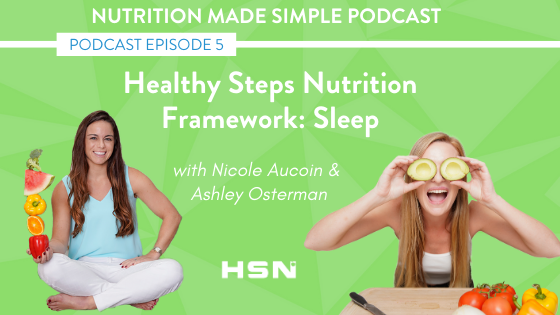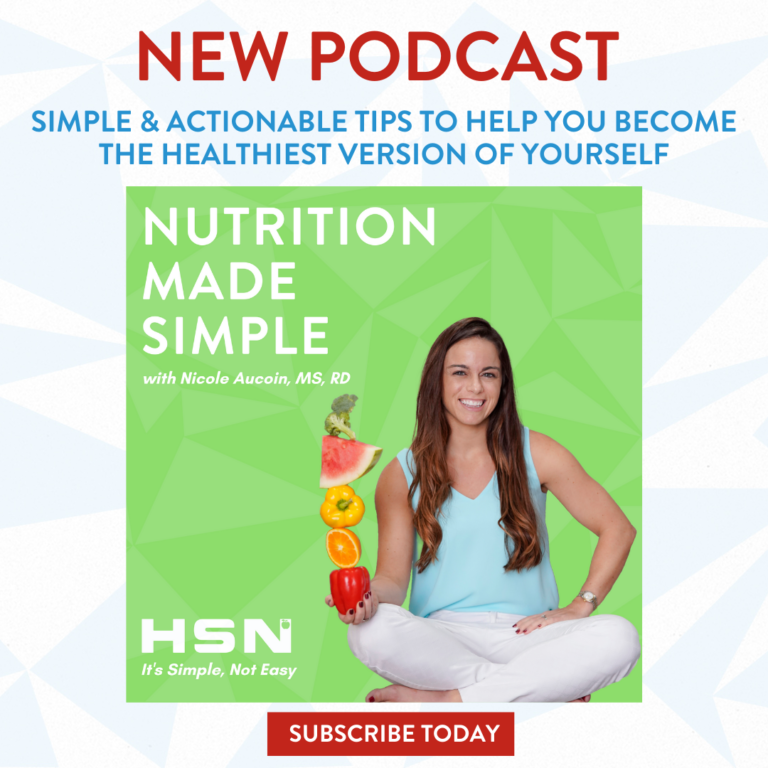Today, Nicole Aucoin and Ashley Osterman discuss the fourth pillar of the Healthy Steps Nutrition Framework: Sleep.
Did you know that your sleep impacts your recovery, mood, energy, food cravings, and metabolic health?
In this episode, Ashley and Nicole discuss:
- What is good sleep
- Why you need it
- How to create healthy sleep habits
Our mission is to empower 4k people in January to ditch the all or nothing mentality and take control of their health one step by listening to this podcast.
Do you know someone who is looking to lose weight? We would love for you to share this podcast with them! You never know who could use some words of encouragement — take a screenshot, post it on social media, and tag @healthystepsnutrition so your friends can find this awesome free help! Also, don’t forget to subscribe to listen to every episode!
PODCAST EPISODES TO LISTEN TO ON THE ADDITIONAL PILLARS OF THE HEALTHY STEPS NUTRITION FRAMEWORK
Episode Transcript:
Nicole Aucoin (00:07):
Welcome back to the Nutrition Made Simple podcast. At Healthy Steps Nutrition we believe something as fundamental as nutrition, shouldn’t be complicated. Which is why we focus on a simple habit based approach when working with clients. We’ve helped over 30,000 people take control of their health through our simple habit based approach. I’m your host, Nicole Aucoin, registered dietitian and founder of Healthy Steps Nutrition, CrossFit HSN, and HSN mentoring. I’m also the author of The Healthy Kids cookbook, 100% kid approved recipes the whole family will love. You can find it on Amazon. In this brand new podcast we will be teaching you how to take one step at a time to become the healthiest version of yourself today. Today, Ashley and I, our director of nutrition education, discuss the fourth pillar of the Healthy Steps Nutrition framework. Sleep. Did you know that sleep impacts your recovery, mood, energy, food cravings, and metabolic health? What’s fascinating to me is what we eat will also impact our quality of sleep.
Nicole Aucoin (01:17):
Jason, my husband and I, conducted a continuous glucose monitoring experiment on ourselves. I ended up doing it for six weeks from Thanksgiving until the end of the year. I wore a monitor that read my blood sugar every three minutes and charted it. If you click the link in the show notes, you can read all about my findings, but one of the most interesting things that I found was how sleep, food and blood sugar all play a part together. Chronic levels of high blood sugar decreases your metabolic health and increases your risk for chronic disease, specifically diabetes.
Nicole Aucoin (01:55):
We found some really interesting things regarding sleep and food. When we ate higher carb at night, our blood sugar stayed elevated. Sugar at night, like ice cream, caused it to be high all night and decreased our quality of sleep. When we slept bad, our fasting blood sugar was increased in the morning. You don’t want your fasting blood sugar to be increased. All of the pillars of the Healthy Steps Nutrition framework work together to help you become the healthiest version of yourself. We’ll get to this episode on sleep right after this message.
Nicole Aucoin (02:34):
Our mission at Healthy Steps Nutrition is to empower 4,000 people in the month of January to ditch the all or nothing mentality and take control of their health one step at a time by first listening to this podcast. Do you know someone who’s looking to lose weight in the new year? We would love for you to share this podcast with them. You never know who could use some words of encouragement. Take a screenshot, post this podcast on social media and tag Healthy Steps Nutrition so that your friends can find this awesome help. Also, don’t forget to subscribe to this podcast so you can listen to every episode. Enjoy.
Nicole Aucoin (03:17):
Ashley Osterman, welcome back to the Nutrition Made Simple podcast.
Ashley Osterman (03:21):
Thanks, Nicole. Always a pleasure to be on.
Nicole Aucoin (03:24):
So today we are talking about sleep. Who doesn’t love a good sleep? I have always loved sleep. I need a solid eight hours or I’m just grumpy, but some people think that they can really function their best with just a couple hours of sleep.
Ashley Osterman (03:40):
Yeah. You know, I always think back to my time in college and those late nights and limited hours of sleep and really how you feel the next day and how you’re attempted to make choices, especially when it comes to your food and your intake that maybe you wouldn’t normally want or crave.
Nicole Aucoin (03:59):
Research shows that you’re more stressed, you’re more hungry and you’re less satisfied with what you eat when you do not get enough sleep. So with a lot of our clients, we work with weight loss, right? A lot of people looking to lose weight. And if you’re more stressed and more hungry and less satisfied, it’s not going to be a great combination for trying to lose weight.
Ashley Osterman (04:19):
No, not at all. And you’re not going to feel good either. And I want to feel good and have a good day after a nice night’s sleep.
Nicole Aucoin (04:27):
Research has shown that good, healthy sleep habit is a central part to health and wellness, and good sleep hygiene aims to really set yourself up to sleep well and enough every single night. What is enough? For most people between seven to eight hours is the recommended amount of nightly sleep. Let’s say you have a young child at home. You do have a young child at home?
Ashley Osterman (04:54):
Yes.
Nicole Aucoin (04:54):
Sometimes eight hours straight in a row is not feasible. It’s not going to happen. Or you might be in a position where you have a job that causes you to have swing shifts. So your sleep might be all over the place. Well, a good strategy is a nap. Naps can be a really handy way to regain your energy during the day, but they can also throw off your sleep at night. So to avoid this, try to keep naps relatively short and limit them to the early afternoon. How long is a good nap? Now, I think it depends on how much sleep you got the night before, but I can say from experience usually about an hour to two is a good enough nap for me.
Ashley Osterman (05:36):
Yeah. You definitely don’t want to not go overboard too much because then you’re not going to be able to sleep later.
Nicole Aucoin (05:40):
Exactly.
Ashley Osterman (05:41):
But they’re handy for when you don’t get enough sleep.
Nicole Aucoin (05:44):
Absolutely. We have to be getting enough sleep. If you’re really looking to optimize your health, you need enough sleep. What are some strategies that people can do to help get into a better routine so that they do sleep the eight hours that we should each night?
Ashley Osterman (05:59):
You know, Nicole, keeping a consistent sleep schedule, having a comfortable bedroom, that’s free of disruptions, and following a bedtime routine, as well as having healthy habits throughout the daytime can all contribute to good sleep hygiene or those healthy sleep habits. To start off, let’s talk about setting your sleep schedule. It’s really recommended to have a sleep schedule as part of your day because it gets your brain and your body into the routine of sleeping for the amount of time that your body needs. So when I talk to people about a sleep schedule, some great tips are to have a set wake-up time. And regardless if it’s the weekday or weekend, try to have that consistent time that you wake up always throughout the week. That will get you into a rhythm of more consistent sleep.
Nicole Aucoin (06:50):
I love that. Julie Foucher and her husband do a lot of research on sleep. They talk about sleep all the time. I’ve had many conversations with her about this, and we’ll probably have her on a future podcast episode, specifically talking about sleep. But some of the things that she has mentioned is you should be waking up without an alarm.
Ashley Osterman (07:07):
Yes.
Nicole Aucoin (07:07):
So if you are constantly having to wake up with an alarm, maybe you’re not going to bed early enough.
Ashley Osterman (07:13):
Right.
Nicole Aucoin (07:14):
Maybe you’re not consistently getting that sleep in a routine that puts your body into that function or that rhythm. Another really good tip is you need to make sleep a priority. It’s so easy and tempting to skip sleep to work or study or socialize, or even exercise sometimes – guilty. But it’s vital to treat sleep as a priority.
Ashley Osterman (07:37):
Absolutely. And I think part of it goes down to what is your shutdown routine at the end of the day at work? Because so many times, like we have so many things going on in our head and that has definitely caused me to stay up at night. But if I do a proper shutdown routine at the end of the day for work, I can really go home, unplug, spend quality time with my family and not have all these lingering things in my head of what still needs get done with work.
Nicole Aucoin (08:00):
Yes, absolutely. And I think that kind of brings us to our next point. You need to be following a bedtime routine. I think bedtime routines are so important because it helps you prepare for bed and can determine how easily you will fall asleep. Because let’s be real, nobody wants to lay in bed and toss and turn. We want to get in bed and start getting that sleep that we need, right? So some good tips when determining your bedtime routine is, of course, to be consistent. You want to be consistent with your routine, follow those same steps every night, including things like maybe getting your pajamas on, brushing your teeth, having some water. Whatever you do at night to help reinforce in your mind that it’s bedtime, right? Another good one is to set aside or budget 30 minutes for winding down. I think so many times we are on our phones or the computer or watching TV or a book right until the time we go jump into bed. But in reality, your body needs time to start transitioning into sleep mode.
Ashley Osterman (09:04):
I think that’s so important because a lot of times, especially if you’re watching something on TV that is high adrenaline, right? You can get riled up and then it’s really tough to transition into, okay, now I need to go to sleep.
Nicole Aucoin (09:14):
Yeah. You really need to unplug from those electronics. So making sure we’re giving our body and our brain the time to kind of power down as well too. Dimming the lights. That’s another great strategy to start kicking your body into the sense that oh, nighttime, right? Dimming lights, shutting your curtains, getting things dark. When you’re in bright lights, you actually prevent melatonin from being produced in your body. So by getting into the dim darker atmosphere, your body will start to produce melatonin, which helps you fall asleep. So really getting those dim lights and shutting those blinds and curtains, turning off those electronics will help shift your body into sleep mode.
Ashley Osterman (09:54):
And if you’re in a place in the world where it is light more often, in Alaska it’s light 23 hours a day, you could get little blindfolds, right? Like little things to put over your eyes…
Nicole Aucoin (10:07):
Yeah, sleep masks.
Ashley Osterman (10:08):
So that you can have a darker area, or blackout curtains, that’s something that we have, so that it gets super dark in our room.
Nicole Aucoin (10:16):
Yes, absolutely.
Ashley Osterman (10:17):
Another thing to think about is what is your temperature like when you’re about to go to sleep? Do you need to have the air conditioner turned down a little bit more to start getting comfortable so you’re not sweating in bed. Do you need to maybe turn a fan on or do something like that to have adequate air flow for you to be comfortable in your bedtime setting. And think about utilizing some methods for relaxation. So if you’re having a hard time falling asleep or getting relaxed before you go to bed, look at meditation, mindfulness, paced breathing, and other techniques that you can put into your practice to get into that mindset, to go to bed.
Nicole Aucoin (10:58):
I love that. You have to be intentional, and there’s not one strategy that will work for every single person. It’s going to vary depending on what type of person you are, what works for you. And you just have to experiment with different things to figure out what is going to work well with you and what doesn’t.
Ashley Osterman (11:13):
Yeah, one of my clients found a lot of success with journaling, reflective journaling at night, before sleep. Just kind of being grateful, putting some words on paper to help get you into that mode of, okay it’s night time. So find what works good for you, what helps you relax and get you into the sleep mode. Next thing I want to talk about is maintaining those healthy habits during the day, because just as important as getting ready for sleep at night and getting in that mindset of relaxation, you need to be thinking about your habits during the day because they really do play a part in getting good sleep. Incorporating positive routines during the day can support your circadian rhythm and limit your sleep disruption. So what am I talking about? Getting daylight exposure, going outside, having the sunshine on your skin. It’s one of the key drivers of the circadian rhythm, and that can encourage quality sleep. Being physically active. Nicole, as you know, there’s so much research that shows when you’re physically active, it helps you sleep better at night.
Nicole Aucoin (12:15):
I know it definitely helps me and a lot of our clients do that. Even if it’s just walking, you don’t need to do super strenuous exercise to get some of those benefits. I will say that many of my clients have told me that exercising at night causes them not to go to sleep as well. So it gets all of their endorphins up. It’s tough for them to unwind, but if they exercise in the morning, they do have those benefits, or earlier in the day, they do have those benefits of sleeping better when they do exercise.
Ashley Osterman (12:41):
Absolutely. And you made such a good point there. You know, just physical activity. Doesn’t have to be going to a gym or exercising, can be walking, doing yoga, be riding a bike, roller skating. Just intentional movement of your body for 30 minutes is going to show you some great benefit and help with your sleep. Also, look out for your alcohol consumption. Alcohol might make it easier to fall asleep, but your quality of sleep goes down the drain. So watch out for the alcohol consumption with your sleep. Also don’t smoke because nicotine is a stimulant and it stimulates the body in ways that disrupts our sleep as well, too. Make sure you’re cutting down the caffeine by the afternoon, because of course that is a stimulant as well. And don’t eat too late. If you’re eating a late dinner, try to make it a little smaller and give yourself at least 20 to 30 minutes before winding down.
Nicole Aucoin (13:34):
Let’s talk about coffee. You and I love coffee. We have coffee sitting in front of us right now. Although it’s earlier in the day, but the half-life of coffee is eight to 12 hours.
Ashley Osterman (13:43):
Yes.
Nicole Aucoin (13:43):
So if you are drinking coffee in the evening, which I have definitely done this before, just working a little bit later, it will impact your quality of sleep and most people don’t even realize that. They say coffee doesn’t affect me. Well, it’s tougher to get into that deep REM sleep where you have that good quality if you’re drinking coffee late at night. So what I would recommend is start drinking it a little bit earlier and cut yourself off, switch to bubbly water or decaffeinated coffee if you just like the taste of it. Or decaffeinated tea, something like that to help you and something that’s not going to impact your sleep.
Ashley Osterman (14:18):
Yeah, I know for me, I really have to stop drinking caffeine by about noon. One o’clock is my latest because after that, I’m not going to bed at my appropriate time. And the last thing I want to talk about, Nicole, is some strategies on how to optimize your bedroom. This is so important. And I think in this season that we’re in right now, sometimes people find themselves working at home and then you end up working from your bed. Your bed ends up not just being for sleep, it ends up being like work and all of the things in your bedroom. So you want to have a calming, comforting sleep environment and I think one of the strategies to do that is to limit the activities in your bedroom. They recommend not to be on your phone in your bedroom, not to watch TV in your bedroom, not to do any activities except sleep in your bedroom. So really making that distinction will help it become a more calming and comforting place to sleep at night and help you get into that sleep mode.
Ashley Osterman (15:20):
Some other great strategies are to make sure you have a comfortable mattress and pillow. Make sure you have good bedding things that are comfortable to you. If you’re a hot sleeper or something, a little lighter. Making sure you’re blocking out your light, blocking out or drowning out noise. If you can’t avoid noise, earplugs are a great strategy. And also try some calming scents, light smells such as lavender may induce a calmer state of mind and help cultivate a positive space for sleep.
Nicole Aucoin (15:47):
I love that. This is something that we do – Jason and I and the kids – we all have air machines in our room, sound machines.
Ashley Osterman (15:53):
Oh, nice. Yeah.
Nicole Aucoin (15:53):
So it’s like a fan, it just makes that kind of white noise sound and it really helps put everyone in the house to sleep a little bit faster.
Ashley Osterman (16:02):
Again, figure out what works for you.
Nicole Aucoin (16:03):
Exactly.
Ashley Osterman (16:04):
What works good for you, because what makes one bedroom inviting and comforting can vary from one person to the next. So think about these tips, think about these strategies. And if you’re having a hard time falling asleep or getting adequate sleep, really pick something that you can start trying out to improve your sleep hygiene, those healthy sleep habits.
Nicole Aucoin (16:26):
I love that. And when we talk about one step at a time at Healthy Steps Nutrition, we really focus on not overwhelming our clients with too much information. Let’s just focus on one thing. It doesn’t mean going from four hours of sleep a night to eight hours of sleep. Do it incrementally. Try to just add 30 minutes at the beginning and the end of when you go to sleep so that you can slowly work up to those seven to eight hours. And most people don’t even know how they’re intended to feel, right? You might not even realize how great you’re supposed to feel because you’re so used to sleeping four hours.
Nicole Aucoin (17:00):
And if you are truly committed to making the healthiest version of yourself, these other factors all play a role in you achieving the goals that you want to achieve. Performance goals. Sleep is so important for recovery and performance, as well as achieving a healthy weight. You have to be able to sleep enough so that your body can reset those hormones, your cortisol levels go down, adrenalin levels, leptin levels, all these hormones that affect how satisfied and how hungry you are throughout the day.
Ashley Osterman (17:32):
It really involves everything. Talking about stress management, talking about your performance, talking about your nutrition choices. It’s just so important to really take into consideration all of the factors, looking holistically at our health and wellness.
Nicole Aucoin (17:46):
Awesome. Well, next up, we are talking about exercise, which my favorite topic, because they go hand in hand with nutrition to help people achieve whatever goal they’re looking to achieve. So tune in for our next episode on exercise.
Nicole Aucoin (18:04):
How would you rate your sleep? Do you notice that what you are eating is affecting your sleep? When you are mindful, I bet you will notice some patterns. It became even more apparent to us when we’re doing that continuous glucose monitoring experiment, what you eat impacts your sleep, which impacts your body’s recovery time and your immune health. Your action today is to pick one tip that Ashley and I discussed to help you create healthy sleep habits. Maybe you darken your room, establish a wind down routine. Maybe it is putting your phone away and limiting electronics and screen time. There are so many things that you could do, but you just need to pick the one that’s going to work for you.
Nicole Aucoin (18:48):
Tomorrow we are talking all about exercise. Exercise increases your metabolic health, helps you manage stress, improve sleep, mood and so much more. Make sure you check out tomorrow’s episode on exercise. But before we go, are you loving this podcast? Our mission at Healthy Steps Nutrition is to empower 4,000 people in the month of January to ditch the all or nothing mentality and take control of their health one step at a time by listening to this podcast. Please share it with someone who you think could use this great help. And don’t forget to subscribe and leave us a review. Thanks. See you tomorrow.







